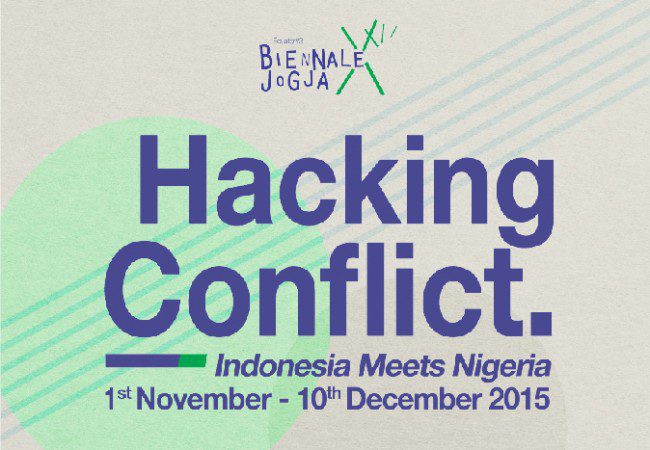Biennale Jogja XIII, Yogyakarta, Indonesia
01 Nov 2015 - 10 Dec 2015

“Hacking Conflicts – Indonesia meets Nigeria” is the 3rd edition of the BJ Equator series, following the first edition in 2011 (India) and 2013 (five Middle East countries). Managed in a new vision and direction by Yogyakarta Biennale Foundation, the Equator series present a strategy that utilises the line the Equator draws around the globe as a concrete practice in exploring and re-reading the world, visioned and projected until the year 2022.
As a biennial event, the BJ XIII will maximise the efforts to make this year Biennale as an event in collaboration with the city’s residents. Thus, apart from using Jogja National Museum as an exhibition space, the BJXIII will also use Yogyakarta’s city spaces and surroundings as a site or a creative arena for artists to intervene on local issues. To this end, the main events will include a Main Art Exhibition, Community Art Projects (Parallel Events), and the Equator Festival.
Hacking Conflict is taken as the theme of the Biennale after observing the shared history of both countries that faced colonialism and recent release from military regime. However, both were only truly free of authoritarian regimes at the end of the 90s. In Indonesia this was signified by the demise of the New Order regime in 1998. Nigeria is unique because its military regime was in fact ended by the military itself in 1999. After the fall of this authoritarian rule, the state and the people both speculated and experimented with democratic systems in seeking the ideal, autonomous form, each according to their understandings and desires. This has created a disharmonious gap in social and cultural infrastructure. The situation became even more chaotic within the understanding of a larger nation (consisting of various ethnicities, traditions and languages) with abundant natural resources.
In practice, individual freedom of speech and opinion for all of these people of diverse ethnicities and languages is a fertile field for the cultivation of opposition and conflict. In this, conflict must always be seen as a positive. Its existence must be invited and understood absolutely as something which must be managed in order to create unexpected harmony. However, in this context democracy is not merely seen at a political level but is also understood as a way of living together in all of our differences and our chaotic economic, social and technological infrastructure, based on the principles of living that society is currently experiencing. A strategic but speculative strategy is required to take apart this conflict, so that it can shift from asymmetrical to symmetrical patterns.
This is an appropriate thing to attempt through dissecting and presenting the bitter seeds of conflict and chaos through imaginative artistic and cultural work; dynamic and open to be enjoyed, contemplated and deconstructed together.
The curatorial team for the Biennale Jogja XIII is formed by Alia Swastika as the Director, Rian Rosidi (Artistic Director), an independent curator and lecturer at the Art Institute of Yogyakarta (ISI), Woto Wibowo (Curator) currently the Director of MES56 Art Space that focuses on the development of contemporary photography, and Jude Anogwih (Associate Curator) from the Centre for Contemporary Art in Lagos, Nigeria. The curators will work together in the implementation of the main programs of the BJXIII.
For the Main Exhibition there have been selected 35 artists, of whom 23 are from Indonesia, and 12 Nigerian artists. Some of the Indonesian selected names: Ardi Gunawan, Anti Tank, Arief Yudi, Dodo Hartoko, Elia Nurvista, Fitri Setyaningsih, ketjilbergerak, Serrum, Tarlen Handayani, Wukir Suryadi, Yazied Syafa’at, Yudi Ahmad Tajudin dan Yustoni Volunteero. A few of the confirmed Nigerian artists are Aderemi Adegbite, Amarachi Okafor, Emeka Udemba, Ndidi Dike, Olanrewaju Tejuoso, Segun Adefila dan Victor Ehikhamenor.